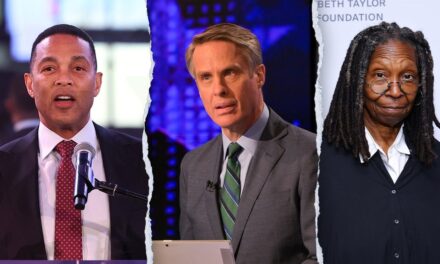In an unexpected turn of events, a Democratic Representative has openly lauded former President Donald Trump for his performance during a recent Middle East tour. This commendation highlights an unusual moment of bipartisanship amid a politically polarized landscape.
The Representative, whose identity remains undisclosed, took to social media to express their views shortly after Trump concluded his tour, which involved meetings with key leaders in several Middle Eastern countries. The statement emphasized that Trump had done “pretty darn well” during his diplomatic engagements, an assertion that has since stirred conversation across both political aisles.
Trump’s tour included visits to nations like Israel, Saudi Arabia, and the United Arab Emirates. During these consultations, he focused on strengthening alliances, discussing regional stability, and addressing pressing issues such as terrorism and economic partnerships. This visit was part of a broader effort to reaffirm U.S. commitment to the Middle East amidst changing global dynamics.
While typically, Democratic lawmakers have been highly critical of Trump’s foreign policies, particularly regarding the Middle East, this Representative’s comments suggest a recognition of the former President’s efforts to engage with international partners. In a political environment where both parties often dismiss each other’s achievements, such praise from a Democrat stands out as remarkable.
This acknowledgment does not indicate complete agreement with Trump’s overall approach to foreign policy, but rather a specific credit for his most recent endeavors. The Representative noted that amidst numerous challenges, Trump’s efforts to foster dialogue among countries often at odds with one another could pave the way for enhanced cooperation and peace in the region.
Comments from the Representative have sparked discussions among constituents who hold a spectrum of political beliefs. Social media platforms erupted with varying opinions, with some praising the articulation of bipartisan acknowledgment while others remain staunchly critical of any approval given to Trump, irrespective of the context.
Trump’s Presidency was marked by notable tensions in international relationships, particularly in the Middle East. Critics argue that his administration’s approach may have led to increased volatility, especially in areas like the Israeli-Palestinian conflict. Nevertheless, this Democratic praise draws attention to a particular episode where Trump appeared to effectively leverage his relationships with foreign leaders.
The Middle East is of critical importance to U.S. foreign policy, with historical and strategic ties reflecting America’s interests. As regional security concerns persist, the ability of former and current leaders to maintain lines of communication is vital. Experts suggest that even diplomatic strides made by political opponents should be recognized for their potential to contribute toward overall stability.
Notably, during his trip, Trump discussed ongoing peace agreements and economic investments, noting that his administration had previously brokered normalization agreements between Israel and several Arab states. The so-called Abraham Accords have received mixed evaluations, yet the Republican party generally touts these agreements as a significant foreign policy victory.
The praise from a Democratic lawmaker could also reflect a subtle shift in the political narrative surrounding Trump’s foreign policy achievements and may indicate that finding common ground is still possible, even after a tumultuous political era. Some analysts argue that if both parties can recognize areas of success—even amidst differing ideologies—this may foster a more productive approach to governance moving forward.
In the aftermath of the Representative’s comments, calls for further bipartisan cooperation in foreign policy initiatives have emerged. There is a growing sentiment among some politicians and constituents that maintaining strategic dialogues regarding the Middle East should transcend party lines, allowing the U.S. to uphold its influential position globally.
As discussions continue, Republican leaders have expressed their appreciation for the Democratic Representative’s comments, emphasizing the importance of unity in achieving diplomatic victories. They assert that acknowledgment of accomplishments should not be reduced to party affiliations but treated as collective successes for the nation.
Conversely, many critics remain skeptical, arguing that anything that signals approval of Trump in the political realm could detract from the accountability necessary for a healthy democracy. They assert this could set a concerning precedent where party leaders critique each other’s policies but laud their opponents when it suits their political agendas.
Trump’s diplomatic tours have often received mixed reactions, and given the significant attention it draws from both Republican and Democratic circles, it remains a topic of crucial discussion. As the political landscape continues to evolve, especially with upcoming elections on the horizon, reactions to these events will likely remain sensitive and highly scrutinized.
Throughout this cycle, one question looms large: can real bipartisanship emerge from moments that acknowledge success, irrespective of party loyalty? The comments by the Democratic Representative may serve as both a beacon of hope and a trigger for increased debate on Trump’s legacy in foreign affairs.
Meanwhile, in light of this unexpected commendation, Trump’s supporters are rallying around his foreign diplomacy, pointing to it as evidence of effective leadership that should not be overlooked by any means. They argue that any positive contributions made while he was in office contribute to a larger narrative of ongoing success for future administrations.
The political dynamics surrounding this announcement will undoubtedly influence the narratives shaped leading to the next Presidential elections. As candidates from all sides take positions on international affairs, the focus will remain on how to navigate the complexities of global diplomacy with insight drawn from various administrations.
At this juncture, only time will tell how this commendation impacts the perception of Trump within the broader context of U.S. history and foreign relations. The evolving discourse suggests an intriguing look ahead as whether this will herald a new chapter of bipartisan efforts or reinforce existing divisions in U.S. politics.































